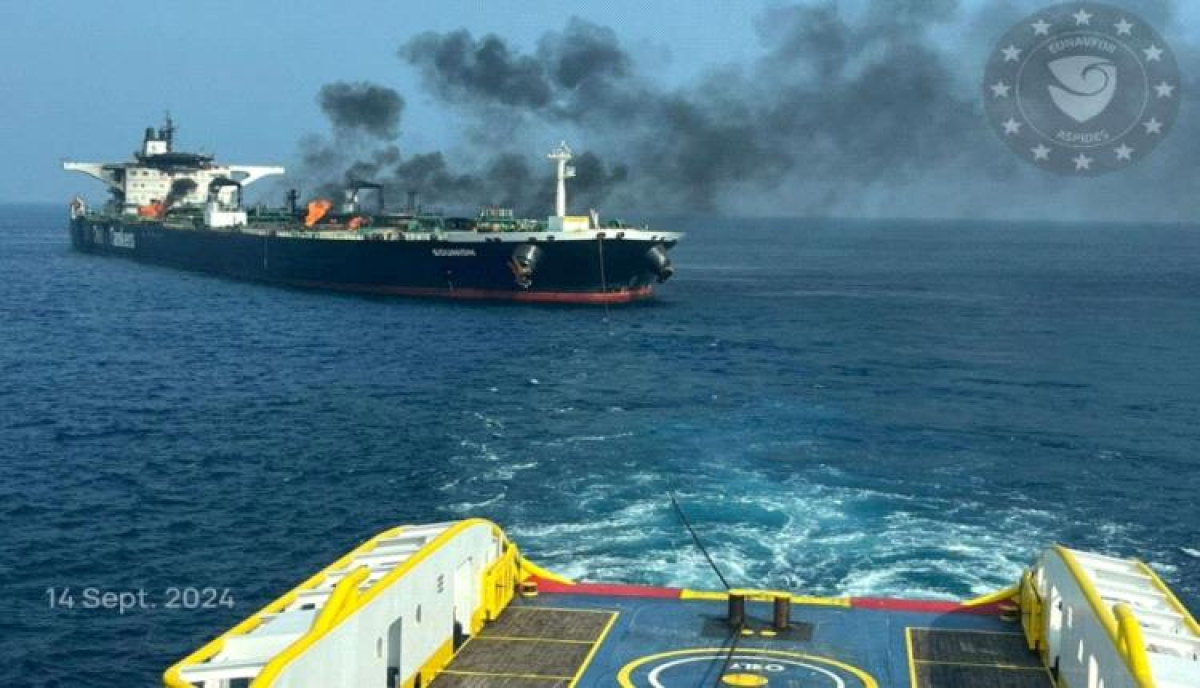Deciphering how the Houthis attacked ships in the Red Sea


An investigation by a Swiss non-governmental organization showed that the naval attacks launched by the Houthis in Yemen against the backdrop of the war between Israel and Hamas in Gaza are supervised by a center for coordinating humanitarian operations established by the rebels this year.
An InPact investigation reported that the operations targeting shipping traffic off the coast of Yemen were supervised by the “Humanitarian Operations Coordination Center (HOCC).”
The center was established in February by a decree issued by the head of the Supreme Political Council, Mahdi Al-Mashat, the highest political official in the Iran-backed Ansar Allah movement.
The center is affiliated with “the Office of the Supreme Commander of the Armed Forces and subject to his supervision,” according to the text of the decree published by Houthi media outlets at the time.
Among its tasks are “mitigating the humanitarian impacts and repercussions... in the theater of military operations” through “compliance with international humanitarian law and other relevant international laws and conventions,” and “communicating and coordinating internally and externally with all parties, governmental and non-governmental agencies, and international organizations.”
The Swiss organization confirmed that the center is run by "Ahmed Hamed, who is an influential figure with the Houthis, and close to Mahdi Al-Mashat and the Houthi armed forces."
A report issued by a United Nations team of experts on Yemen in 2021 considered that Hamed “may be the most powerful Houthi civilian leader outside the Houthi family.”
Since November, the Houthis have launched missile and drone attacks on commercial ships in the Red Sea and the Arabian Sea, which they say are linked to Israel or heading to its ports. They say this comes in support of the Palestinians in the Gaza Strip in light of the ongoing war between Israel and Hamas since October 2023.
p>To try to deter them, American and British forces have launched strikes on Houthi sites in Yemen since January 12. The US Army alone carries out strikes from time to time on missiles and drones that it says are prepared for launch. After that, the Houthis confirmed that the American and British ships had become legitimate targets for them.
The Swiss organization’s investigation touched on the working method of the Humanitarian Coordination Center, which controls the selection of companies whose ships are allowed to cross the waterways bordering Yemen, especially the Bab al-Mandab Strait. He explained, "The Humanitarian Aid Coordination Center is likely involved in identifying targets and attacks."
The organization reported that the center “institutionalizes the armed group’s maritime guerrilla warfare,” and that it “provides means for ships to communicate with the organization directly,” such as radio communication devices, telephone numbers, and email addresses.
The Swiss organization published an email sent by the Houthis in March to the United Nations International Maritime Organization, which is responsible for maritime safety.
This document prohibited the crossing of ships belonging to four categories of transport companies: those belonging to, operated or managed by Israel, the United States, or Britain, in addition to those with one of their ships heading to an Israeli port.
The Center requested the United Nations to inform the companies that own and operate ships, in addition to insurance companies, of this.
The Houthi attacks led to a sharp decline in shipping traffic off the coast of Yemen.
An international maritime company confirmed to Agence France-Presse that it had received several messages from the Houthis, the last of which dates back about eight months. The messages requested that ships not cross off Yemen on the risk of being targeted.
The Swiss organization said that Hamed, who is the director of Al-Mashat’s office, “is known as the ‘president of the president’ because all strategic decisions of the Houthi government are not taken without his approval.”